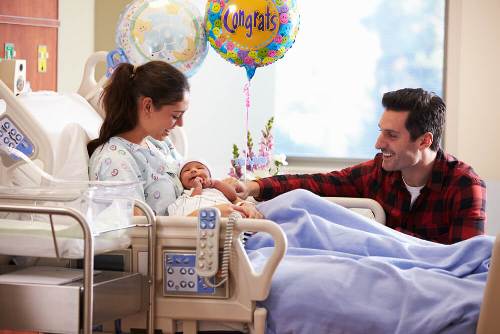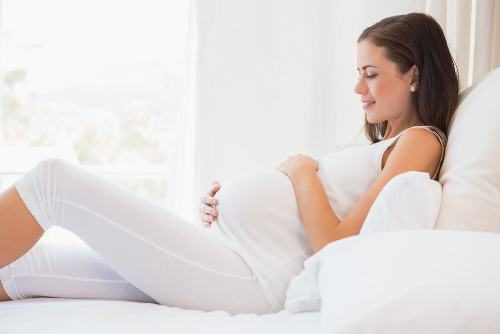This post is also available in: English हिन्दी (Hindi) বাংলা (Bengali)
Following childbirth women need extra tender loving care from their partner and lots of support from the family but finally it’s up to you to look after yourself so that you can be the perfect backbone for your family. Labour and childbirth are physically demanding and so is breastfeeding and looking after a newborn baby.
It takes six to eight weeks for a woman’s vagina to heal from a delivery and the uterus to come down to normal size and while these physical changes are taking place and the hormones are coming back to normal it is important to take care of your physical and mental health.
Healthy women and their newborns should stay at a hospital for at least 24 hours after a normal vaginal delivery, and 3 days after a Caesarean section.
Post that mothers and babies need at least four postnatal visits in the first 6 weeks: (1) 3 to 5 days after birth, (2) 2 weeks (Days 10–15) after birth (3) 4 weeks after birth and (4) 6-8 weeks after birth.
You may have bleeding from your vagina for up to 6 weeks. It will slowly become less red, then pink, and then will have more of a yellow or white colour. Bleeding and discharge after delivery is called lochia. If the bleeding is excessive or lochia is foul smelling then you must see the doctor immediately
Taking care of episiotomy stitches

Pat the area dry with a clean towel after you bathe. After you urinate or have a bowel movement, spray warm water over the area and pat dry with a clean towel. Don’t use toilet paper. Do your pelvic floor exercises. This stimulates blood circulation in the area and helps speed up the healing process.
Care of the Caesarean incision

If you go home with a dressing (bandage), change the dressing over your cut once a day, or sooner if it gets dirty or wet. Keep your wound covered till your doctor instructs you and inspects it by day 10. After that keep the wound area clean by washing it with mild soap and water. You don’t need to scrub it. Often, just letting the water run over your wound in the shower is enough. You may remove your wound dressing and take showers after day 7 if stitches or staples were used to close your skin. Do not soak in a bathtub or go swimming until your doctor tells you it is ok. In most cases, this is not until 3-4 weeks after surgery. I would recommend a scar softening ointment for about a month after the Caesarean.
Diet

Women in the postnatal period need to maintain a balanced diet, just as they did during pregnancy, to regain their strength and to help repair tissues and build up their reserves.
- Eat warm comforting foods like soup and stews.
- Hydrate well, 10 to 15 glasses of water a day are required to produce enough breast milk.
- Eat collagen-rich foods to support tissue repair.
- Eat a nutrient-dense diet. Have large helpings of colourful vegetables and fruit, healthy proteins, fats, and certain grains.
- Take the appropriate supplements. Iron and Folic Acid supplements should be continued for 3 months after birth.
- Eat small meals throughout the day to keep your strength up. Consume lean proteins, fruits and vegetables and high-fiber snacks to avoid constipation.
Menstrual Hygiene

Sanitary pads are convenient but need to be changed every 4-6 hours, to maintain hygiene and reduce chances of infection. Maternity pads are longer, softer, and much more absorbent as compared to the regular ones. Whether you decide to use cloth pads, disposables, or a combination of both, it is entirely a personal choice.
Sex and Contraception

Sex is a not recommended for at least four weeks so your vagina has the time to heal. You may feel some pain in your perineum, which is the area between your vagina and anus, but you can ease this with an ice pack and some anti-inflammatory medicines.
Postpartum contraception is important as pregnancies during this period hold the greatest risk for mother and baby. It’s possible to become pregnant again very soon after the birth of a baby, even if you are breastfeeding and even if your periods haven’t returned. Contraception should be considered 3 weeks after delivery if you are not breastfeeding and 6 weeks after birth if you are.
Sleep

Try to sleep whenever baby does and don’t be afraid to ask for help.
I recommend a massage as it is an excellent stress buster and mood elevator. It eases sore spots and relaxes muscle tension. A postnatal massage will give you some time alone. The break will give you the strength to meet the many needs of your baby and home.
Don’t worry, the only thing that matters right now is that you take care of yourself and your child
And don’t forget it is good to have some pampering in the form of a manicure, a pedicure and a blowdry for your hair.
Call the Doctor if you have …

… Vaginal bleeding that is still very heavy (like your menstrual period flow) after more than 4 days or if it is light but lasts beyond 4 weeks and you pass large clots along with it.
… Swelling in one of your legs (it will be red and warmer than the other leg).
… Pain in your calf.
… Redness, warmth, swelling, or drainage from your incision site, or if your incision breaks open.
… Fever.
… Increased pain in your abdomen.
… Discharge from your vagina that becomes heavier or develops a foul odour.
… A tender, reddened, or warm area on one breast (this may be a sign of infection).
Also call the doctor immediately if you become very sad, depressed, or withdrawn, and you feel like harming yourself or your baby, or are having trouble caring for yourself or your baby.

Dr Rajul Matkar
Specialist Obstetrician & Gynaecologist
About the author of the blog
Dr Rajul Matkar is an internationally-recognized Obstetrician & Gynaecologist, with 27 years of clinical experience. She has received specialized training in minimally-invasive gynaecologic surgery from Kiel University, Germany, and has completed training for advanced colposcopy and directed procedures under the British Society for Colpo Cervical Pathology (BSCCP).
Dr. Matkar is a respected and sought-after source for the popular press and has been quoted in several publications in India and abroad. She has also given talks at various scientific institutes in the UAE.
This post is also available in: English हिन्दी (Hindi) বাংলা (Bengali)










